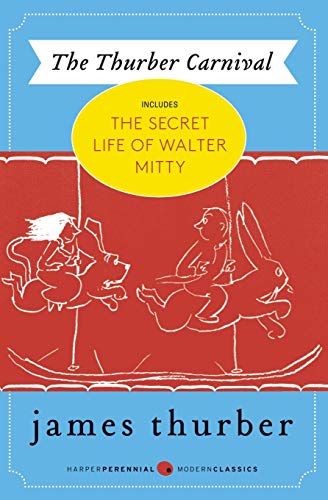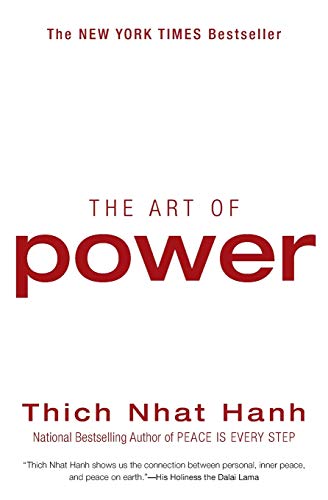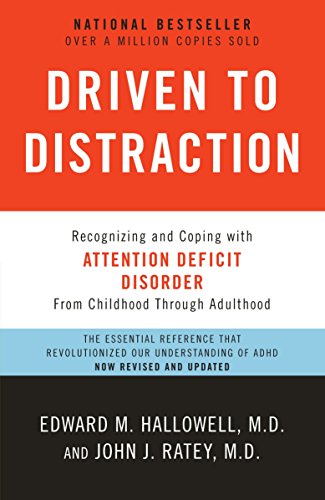(Part 2) Top products from r/infp
We found 20 product mentions on r/infp. We ranked the 161 resulting products by number of redditors who mentioned them. Here are the products ranked 21-40. You can also go back to the previous section.
22. Visual Intelligence: Sharpen Your Perception, Change Your Life
Sentiment score: 0
Number of reviews: 1
Houghton Mifflin
 Show Reddit reviews
Show Reddit reviews27. The Thurber Carnival (Perennial Classics)
Sentiment score: 1
Number of reviews: 1
Harper Perennial
 Show Reddit reviews
Show Reddit reviews28. Influence: The Psychology of Persuasion, Revised Edition
Sentiment score: 1
Number of reviews: 1
Collins Publishers
 Show Reddit reviews
Show Reddit reviews30. The Authenticity Hoax: Why the “Real” Things We Seek Don't Make Us Happy
Sentiment score: 0
Number of reviews: 1
 Show Reddit reviews
Show Reddit reviews31. Journey to the Heart: Daily Meditations on the Path to Freeing Your Soul
Sentiment score: 1
Number of reviews: 1
Journey to the Heart Daily Meditations on the Path to Freeing Your Soul
 Show Reddit reviews
Show Reddit reviews32. What Type Am I? Discover Who You Really Are
Sentiment score: 1
Number of reviews: 1
Penguin Books
 Show Reddit reviews
Show Reddit reviews33. The Portrait of a Lady (Penguin Classics)
Sentiment score: 1
Number of reviews: 1
 Show Reddit reviews
Show Reddit reviews34. The Art of SpeedReading People: How to Size People Up and Speak Their Language
Sentiment score: 1
Number of reviews: 1
Little Brown and Company
 Show Reddit reviews
Show Reddit reviews35. A Guide to the Good Life: The Ancient Art of Stoic Joy
Sentiment score: 0
Number of reviews: 1
 Show Reddit reviews
Show Reddit reviews36. Better Never to Have Been: The Harm of Coming into Existence
Sentiment score: -1
Number of reviews: 1
Oxford University Press USA
 Show Reddit reviews
Show Reddit reviews37. Tog on Interface
Sentiment score: 0
Number of reviews: 1
ISBN13: 9780201608427Condition: NewNotes: BRAND NEW FROM PUBLISHER! 100% Satisfaction Guarantee. Tracking provided on most orders. Buy with Confidence! Millions of books sold!
 Show Reddit reviews
Show Reddit reviews38. One Hundred Love Sonnets: Cien sonetos de amor (English and Spanish Edition)
Sentiment score: 1
Number of reviews: 1
 Show Reddit reviews
Show Reddit reviews







Start here for some cool entry-level stuff. There are many more sites like it. Do some research on what skills you need to also score some jobs that are work from home, or that give you lots of free time, or that generally just seem like a "wow I can get paid to do that?" type job. And just assign yourself homework. Even if it takes years, eventually you'll be competent enough to apply to some things from self education, or otherwise maybe find a more traditional educational path the get you where you want to be. You have your entire life to find a niche to fill in this thing we call society, and you may find some niches where people are just like you--doing what they do, but living for life more than anything. It's about the journey, and maybe you'll find that niche at age 59, but between now and then you'll have some awesome memories about all the trial and error, experimentation, exploration, and realizations. Just poke around, see what happens!
EDIT: I'd totally recommend some fun, INFP fitting books also--not work related, but more "how to fit into the world related". The first one I finished last week and it makes me think about how society can be all a game, and extremely hard to escape from, even if you go to the fringe. The second two I read one summer, 8 years ago, and they completely shaped my worldview and decision-making about who I want to be.
My suggestions:
Henry James. The very height of linguistic English romanticism. "Portrait of a Lady"
I adore James. And he was a master of punctuation; I challenge anyone else to create a paragraph of two entire pages that is perfectly cogent.
James was a literary romanticism god.
Bonus edit - My college English prof hated James. When he found out I loved HJ, college prof gave me all of the James books in his personal library. I was elated, I still have them. :)
https://www.amazon.com/Portrait-Lady-Penguin-Classics/dp/0141439637
> Hahaha, very amusing as I was just thinking the same thought to myself! "I don't think I quite meant that sentence like I stated it, perhaps I need to re-evaluate what I actually mean." It's more like, we've given certain words too much power? I feel the thought in my head, I'm just struggling to articulate it exactly. Because if you asked me "Do words have power" my answer would be "yes." This is a contradiction, seemingly. I suppose what I'm saying is that we give specific words too much energy or power, or perhaps it's even deeper on a language level? Some are trying to change our language into something that I feel is less useful to us? Or that sometimes I feel that our language is being hijacked in order to serve a specific agenda, and force dialogue into certain channels? I shall keep pondering what I actually mean...
Ok, that made sense, and I would agree. Certain words and ideas hold more power than they "should." That's a very interesting, very complex topic. I'm not sure what I mean by should, but for example, screaming terrorist on Sept 12 2011 probably held a different meaning that day, and for many days following. I don't mean that it actually "had a different meaning;" it would be more accurate to call it a different effect.
> Back to that peculiar situation we sometimes find ourselves in, where there are two truth's in opposition to one another. The reason I'm beginning to see isn't that it's necessarily the universe that holds the two truths in opposition, but our own language that defines things rigidly, that makes things seem in opposition to one another, but in reality are part of a greater whole.
Yes. 2x yes.
I've mentioned Wittgenstein a couple times here before, but if you want to make headway on language and its usage, you should try reading his two works Tractatus Logico-Philosophicus and Philosophical Investigations.
I've been eyeing the Tractatus in my pile of books, but honestly my mind is not yet advanced enough to understand it to the degree I feel it deserves. But maybe you might find it worth the read regarding language and its usage. He was huge on word games - not playing them, well maybe, but I think he had a truly holistic understanding of language.
EDIT: And while we're on the topic of language, since I cannot seem to escape the Being-Becoming duality, I instead attempt to embrace it to the extent that it furthers my understanding of the world.
Let's take the sentence "I don't know that yet." The most important takeaway from that sentence is that it does not read "I don't know that." The expectation of future understanding exists when you include the word, sure, but does expectation of future understanding not exist if you exclude the word 'yet'? The answer must be no, and it's quite easy to prove so, but to leave it at that would be folly. Does not including the word 'yet' have an implication regarding a trajectory of the mind and body? Why did that person not say the word yet? Do they not think understanding may come in the future? The man that says 'yet' is already thinking with energy into the future, and as such, I tentatively argue that the inclusion of the word yet, its mere inclusion, has consequences on whether or not you will achieve whatever came before 'yet'. Alternatively, the man that considers future understanding and excludes the word 'yet', purposefully or not, must in some manner be limiting himself.
So, does the man that says 'yet' and attains that future understanding exist as the man who was going to know, always going to know, or does that same man exist as the man that knows because he said 'yet'?
Ultimately, I see man as trying to separate himself from language, but that is an ignorant perspective. Ignorant of the vast interconnectivity of EVERYTHING. Oh there is so much to say about language... I would say other than trying to answer why there is something and not nothing, language might be the most complex and befuddling topic in existence.
At 27 I did. Wish I knew sooner because my life has been improved dramatically by acknowledging who I am rather than who I think I should be (which was largely determined by others' expectations of me).
If you want to deep dive, I'm a huge evangelist concerning the personalityhacker podcast/website -> https://personalityhacker.com/
You can find some INFP-specific podcasts on the site which can validate a lot of things in your life.
There are also some neat books that I think are great introductory/overview material to this area of study that you can probably find at your local library like the ones below. I recommend them to people that I think find MBTI-related study interesting/want another lens to look at themselves with.
(My favorite broad introduction to types. Hardly technical but accurate, I believe)
https://www.amazon.com/What-Type-Discover-Who-Really/dp/014026941X/
(Career focused one)
https://www.amazon.com/Do-What-You-Are-Personality/dp/031623673X
(One that talks about the theory in general but gives interesting suggestions on how to communicate with different types [note to self, look at what you need in conversations under your section to get your needs met conversationally])
https://www.amazon.com/Art-SpeedReading-People-Speak-Language/dp/0316845183/
(One that talks about personality types for children but can still be used to be insightful for yourself)
https://www.amazon.com/Nurture-Nature-Understand-Childs-Personality/dp/0316845132/
(Excellent book about just infps)
https://www.amazon.com/Comprehensive-INFP-Survival-Guide/dp/1945796154/
Warning: if you're an INFP and you start looking at information about other types, you will probably be constantly debating in your head as to which type you are. This is normal.
I think the best thing an INFP can do with such self knowledge is to a build a life to get their needs met without being righteously indignant (i.e. a jerk) about it when faced with resistance
We all have our short-comings and limitation. Also we have our uniqueness. We must look at things that we do right. Where we have a flow. We must seek knowledge and wisdom. Philosophy. These things makes us better. Rather they reveal the best parts of us.
Here are some books that have helped me:
Here are some things I have saved that I read on and off
"What you need now to do is, to check how much you are on the feeling level and how much on the thought level. Most are, and naturally, on the thought level because that is our comfort zone. We have to act on that level. It is the functional level. We need it to study, operate, plan, achieve and so many other things like research, analysis, But we need the feeling level to relate to others. Sadly this is much neglected and we use our thought level to deal with others. we are not in touch with our feelings. To be a sensitive person we need our feelings. We will even rationalize away our feelings. So this is the beginning. "
"Feed your head." -Grace Slick
Where you are headed is more important than how fast you're going, yet people are consumed with speed rather than direction.
Concentrate every minute on doing what's in front of you with precise and genuine seriousness, tenderly, willingly, with justice. And on freeing yourself from all other distractions. Yes, you can, if you do everything as if it were the last thing you were doing in your life, and stop being aimless, stop letting your emotions override what your mind tells you, stop being hypocritical, self-centered, irritable. You see how few things you have to do to live a satisfying and reverent life? If you can manage this, that's all even the gods can ask of you.
-- Marcus Aurelius
Check /r/Stoicism or r/meditation
The bad things, don't do them.
The good things, try to do them.
Try to purify, subdue your mind.
That is teaching of all buddhas.
"If you are becoming a more patient, kinder, and less violent person, you are truly learning life's lessons."
Be a Wanderer and find the inner master that lies dormant within you.
For me, meditating on no-thought daily. Reading into zen philosophy, and incorporating it into my life. I absolutely adore Alan Watts, and he's a great place to start - I'd recommend The Book if you want to jump in the deep end, or The Wisdom of Insecurity if you want to start more shallow.
Once you re-orient your life-philosophy (dorky as that sentence sounds) to focus on the now and the recognition that reality goes far beyond the labels we apply to it, the daily maintenance is rather easy. I meditate to clear my mind and re-orient myself, contemplate, and listen to what my body needs - not every person that follows zen does this, but I do, and for me, it's the healthiest, best thing I could possibly do.
just popping in to say please read james thurber he is the greatest humorist of all time i swear. also, the secret life of walter mitty is nothing like most of his stories, which are almost all straightforwardly hilarious.
http://www.amazon.com/The-Thurber-Carnival-James/dp/0060932872
i haven't seen this movie or anything but yeah \^ good place to start
(i also couldn't believe it when i heard someone had made a MOVIE out of a short story that takes place over like 5 min but i'm afraid to go see how they did it)
Pablo Neruda is my poetic spirit animal. His words are incredibly lush, deeply evocative, and wildly sensual. I would recommend The Essential Neruda for a wonderful introduction to his work, and One Hundred Love Sonnets to stir the soul and make you weak in the knees. :)
I got diagnosed with ADHD when I was 23 and began treatment within six months. It changed my life; six years later and I am a confident expert and leader in my field, with a level of self-esteem and joy that I never thought achievable before.
If nothing else, do yourself a favor and read Driven to Distraction!
I would suggest Influence and Pre-Suasion by Robert Cialdini. They both do an excellent job explaining how people make decisions in the heat of the moment. He includes lots of stories and examples so they are both a very interesting read.
Yeah this is called Journey to the Heart
It has bunch of good meditations. I snapped a picture of the one at my yoga studio.
Cool, have you read The Satanic Bible by Anton Szandor Lavey?
Tog once observed that, while MBTI intuitives only make up 25% of the general population, they made up 75% of engineers at Apple, and other obscenely high percentages of non-engineering roles there.
Of course, mid-1980's Apple was not exactly your typical computer company.
tangentially related book
I'm just gonna leave this here and run:
http://www.amazon.com/The-Authenticity-Hoax-Things-Happy/dp/0061251356/ref=dp_ob_title_bk
Can I ask if you're a man or a woman? I think there's a chance that you could relate to this essay regardless by Leslie Jamison called "The Grand Unified Theory of Female Pain." I think the title of the essay should really just be 'The Grand Unified Theory of Pain' because I think the things she talks about feeling in this essay are pretty universal. Leslie Jamison has been through some tough times (her eating disorder and the surgery she had for her heart condition come to mind), but she talks about always feeling like her pain wasn't worth feeling, writing about, or talking about. I think at some level we're always going to feel like our pain isn't valid because there's always somebody who's been through something objectively worse than we have. Leslie believes that all pain is valid, no matter how "common" the life experience is that's causing you pain. Going through a bad breakup, an example that Leslie uses in the essay, is a hard, sad, character-building experience. Why shouldn't you allow yourself to claim that pain, to look back on that time in your life and say that was hard, but I grew from it? Those long periods of time that you spent feeling like shit... I'm sure that was hard. Don't invalidate your pain. There are some people out there arguing that even the best lives are painful and hard.
Leslie also talks about, either in this essay or one of the other essays in her book The Empathy Exams, how she sometimes wished for bad things to happen to her. I could talk about this essay forever, but it really helped me, so I think you should just read it. Leslie articulates this argument that all pain is valid a whole lot better than I do anyway!